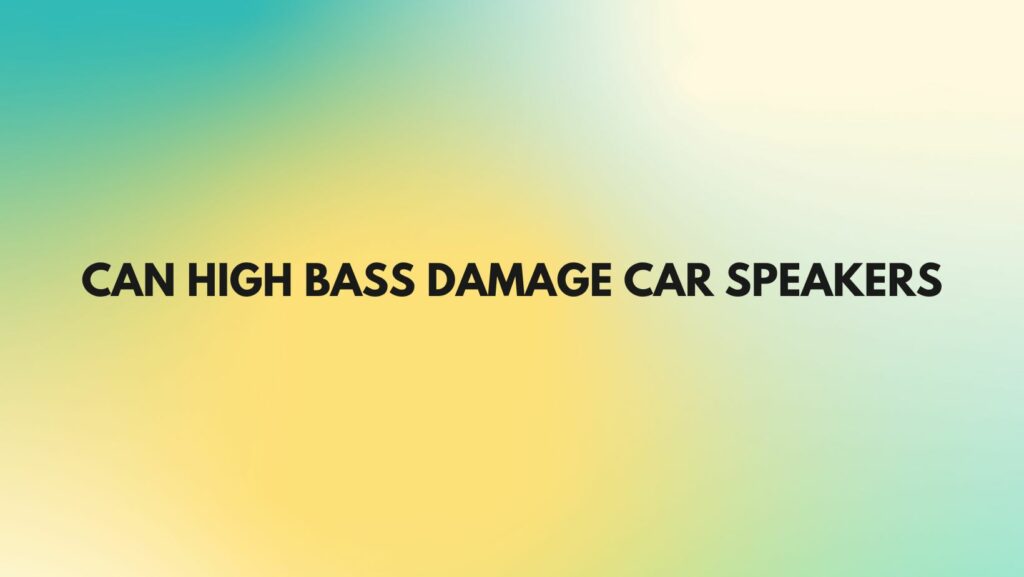Car audio systems have come a long way from the days of basic factory-installed stereos. Nowadays, many car enthusiasts invest in high-quality audio setups that can deliver powerful bass for an immersive listening experience. However, the question often arises: can high bass damage car speakers? In this comprehensive guide, we will explore the potential risks and provide valuable insights into how you can protect your car’s audio system.
I. Understanding High Bass
High bass, also known as deep or low-frequency bass, typically encompasses sound frequencies in the range of 20Hz to 80Hz and lower. It’s this thumping, chest-rumbling bass that adds a sense of depth and excitement to your car’s audio experience. To achieve this effect, car audio systems often incorporate subwoofers designed to handle the demands of high bass frequencies.
II. Risks of High Bass on Car Speakers
- Overexcursion: One of the primary risks associated with high bass in car audio systems is overexcursion. When subwoofers are exposed to excessive low-frequency vibrations and pushed beyond their physical limits, the speaker cone may move excessively, potentially causing damage.
- Distortion: High bass, when pushed to extreme levels, can lead to distortion in the sound output. Distorted audio not only affects the listening experience but can also harm the speakers over time. Prolonged exposure to distorted sound may cause permanent damage to the speakers’ diaphragms and voice coils.
- Thermal Overload: Subwoofers generate heat when they operate at high volumes or for extended periods. If the subwoofer’s voice coil or other components get too hot, it can lead to damage, ultimately affecting the speaker’s performance.
- Enclosure Mismatch: Car audio systems are typically designed to work in specific types of enclosures, such as sealed or ported boxes. Using the wrong enclosure type for your subwoofer can impact its performance and potentially lead to damage.
- Overpowering: Using an amplifier that provides more power than the subwoofer can handle may result in overexcursion, overheating, and potential damage to the speaker.
III. Protecting Your Car Speakers from High Bass
To ensure the longevity of your car speakers while enjoying high bass levels, consider the following precautions:
- Use Compatible Components: Make sure your subwoofer, amplifier, and the rest of your audio system components are compatible. Match the power ratings, impedance, and ensure that the subwoofer is suited for the enclosure you’re using.
- Set Volume Limits: Avoid pushing your audio system to its limits for extended periods. Maintaining a reasonable listening level can prevent thermal overload, distortion, and potential damage to your speakers.
- High-Pass Filters: Install high-pass filters in your car audio system to block extremely low frequencies from reaching your subwoofer. This can help prevent overexcursion and distortion.
- Monitor Temperature: Pay attention to the temperature of your subwoofer. If it becomes excessively hot, it’s time to reduce the volume or take a break to avoid thermal damage.
- Regular Inspection: Periodically inspect your car speakers and subwoofer for visible damage, such as tears or cracks in the diaphragms and voice coils. Address any issues promptly to prevent further damage.
- Upgrade Cables: Using high-quality, appropriately sized cables can improve power delivery, reduce resistance, and ensure that your subwoofer receives the correct amount of power, decreasing the risk of overpowering.
- Follow Manufacturer Recommendations: Always adhere to the manufacturer’s guidelines and recommendations for setup, power levels, and usage, as provided in the user manual.
Conclusion
High bass can be a thrilling addition to your car audio system, but it does come with potential risks for your car speakers. By understanding these risks and taking the appropriate precautions, you can enjoy your car’s audio system to the fullest while protecting your valuable speakers from potential damage. Remember that a well-maintained audio system is not only a pleasure to listen to but also an investment that can provide years of enjoyment.


